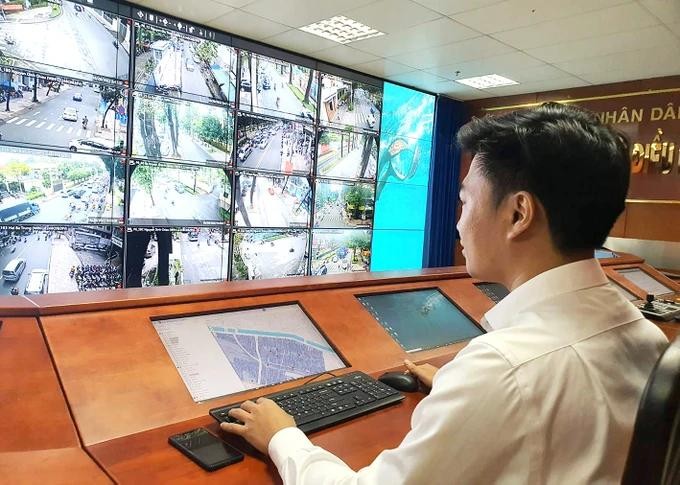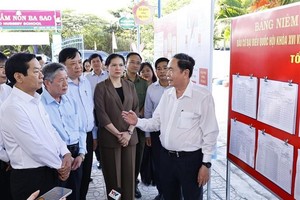
These datasets cover 13 key areas like education, health, society, and the environment. This initiative allows individuals and organizations to explore and utilize this valuable information.
Nguyen Tien Tan, a resident of District 12 in Ho Chi Minh City, needed to find a notary office to finalize a vehicle ownership transfer with the buyer. He visited the Ho Chi Minh City Data Portal (http://data.hochiminhcity.gov.vn) and accessed the judicial sector database. This resource conveniently provided a list of all 117 notary organizations in Ho Chi Minh City, allowing him to choose a location that worked best for both himself and the buyer.
Three days later, Mr. Tan visited the headquarters of the traffic police in District 12 to obtain the license plate number without needing to complete any additional procedures. The advantages Mr. Tan experienced were a result of the Project on Developing Data Applications for Population, Identification, and Electronic Authentication, aimed at facilitating the national digital transformation during the 2022-2025 period, with a vision extending to 2030 (Project 06) in Ho Chi Minh City.
By early October 2024, authorities in the health sector successfully synchronized VNeID data with citizen identification cards for nearly 8 million social insurance participants in Ho Chi Minh City, achieving a rate exceeding 97 percent. All medical facilities have implemented the use of chip-embedded citizen identification cards for medical examinations and treatments.
Additionally, over 14 million citizens have utilized citizen identification cards in these healthcare services.
Nguyen Thanh Nhan, Head of the Information Technology Department at Ho Chi Minh City Social Insurance, noted that using chip-embedded ID cards or the VNeID application for medical examination and treatment procedures has streamlined the process, saving time for both patients and medical staff.
Additionally, social insurance agencies benefit from reduced costs in printing and issuing health insurance cards. With the application of biometric technology on chip-embedded ID cards or health insurance card images on VNeID and VssID, the registration process for medical examination and treatment takes only about 6-15 seconds.
Director of the Department of Information and Communications of Ho Chi Minh City Lam Dinh Thang stated that in 2022, the city introduced the Public Service Portal, marking the first instance of a unified administrative procedure information system across the entire city. Prior to this initiative, there were over 40 distinct public service portals operated by various departments, branches, and localities.
By 2023, Ho Chi Minh City authorities were aware of the significance of digital data and designated it as the focal theme for the year of digital transformation. Notably, in 2024, with guidance from the World Bank, the city officially implemented a data management strategy, positioning itself as a leader in developing a comprehensive data strategy at both provincial and city levels.
Ho Chi Minh City aims to have all administrative management work based on data and integrated into a digital platform by 2025. To achieve this, the city must build a data management system founded on processes, policies, and platforms. However, Director Lam Dinh Thang highlighted that the main challenge is the interconnection and sharing of data between ministries, branches, and different departments and localities within the city.
Addressing this, Director Le Van Thinh of the Department of Labor, Invalids, and Social Affairs of Ho Chi Minh City emphasized the need to enhance data standardization, unify detailed data structure standards for units to enable digital data extraction, and increase investment in information technology. This includes applying advanced technologies for data integration and sharing.
According to Director of the Ho Chi Minh City Digital Transformation Center Vo Thi Trung Trinh, it is necessary to promote data strategy to create and share among agencies, form a culture of data sharing, and facilitate digital transformation. Ms. Vo Thi Trung Trinh said that the group of tasks that the Ho Chi Minh City Digital Transformation Center has been implementing since the beginning of the year is to stably operate the city's shared digital platforms; ensure shared infrastructure, information security and deploy new shared digital platforms for Ho Chi Minh City.
In particular, the Ho Chi Minh City administrative procedure settlement information system is guaranteed to operate regularly, connect with the national database on population, authenticate electronic identification VNeID. This is an information portal to receive and resolve public services directly and online in a unified manner in the city. In the first nine months of 2024, the system received more than 2.7 million records; connected to authenticate electronic identification over 2 million times.
The HCMC Administrative Procedures Handling System also deploys technical solutions to receive documents regardless of administrative boundaries and an information system serving the operations of the HCMC Public Administration Service Center.
























